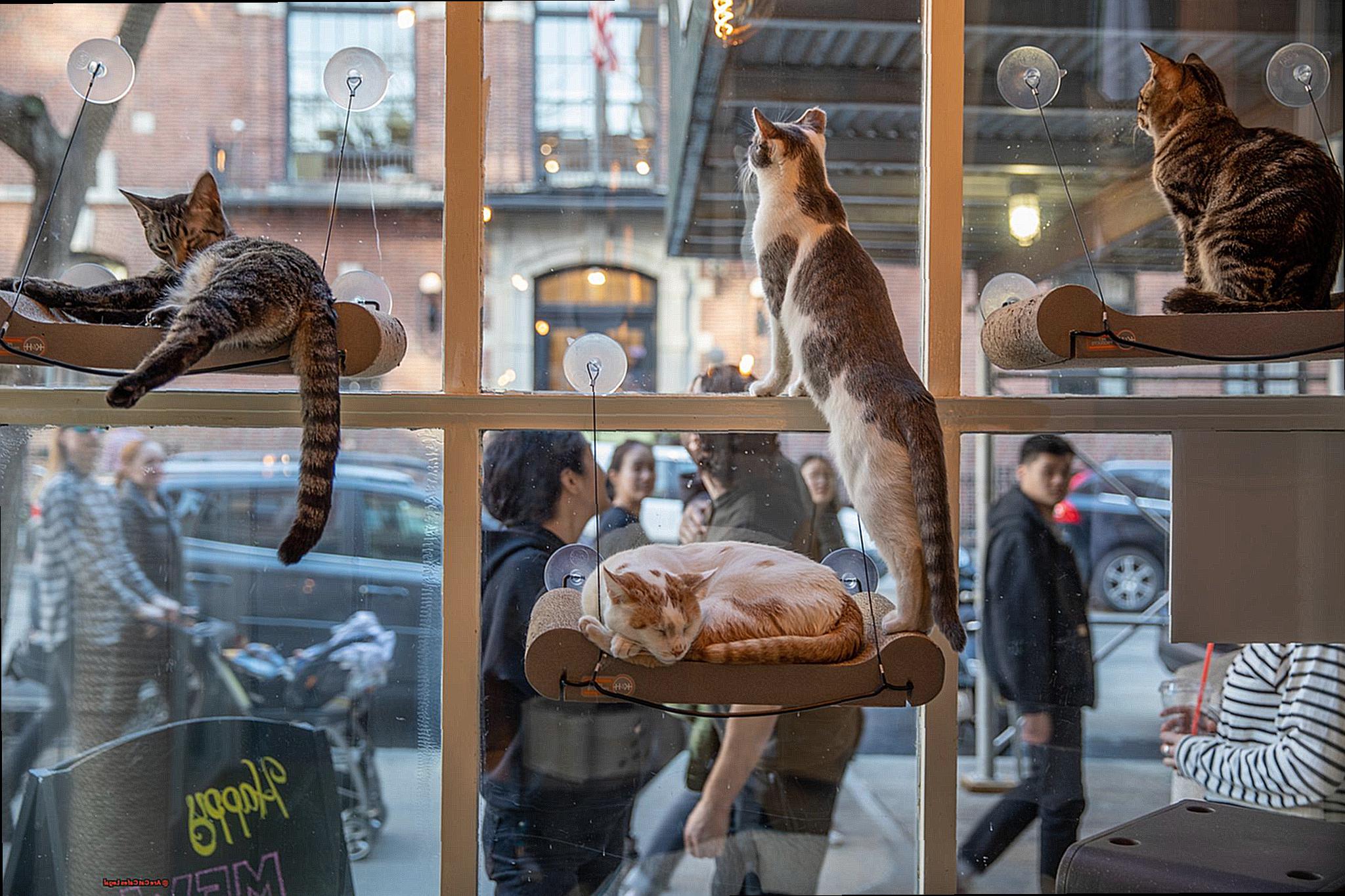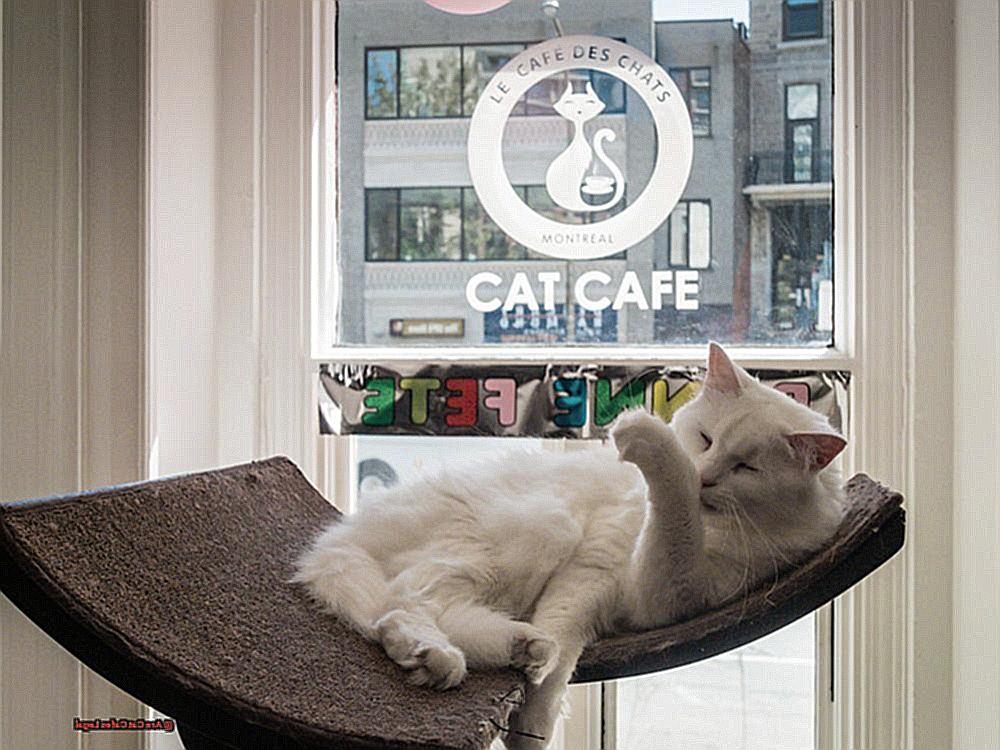Step into the warm and inviting atmosphere of a cat cafe, where the aroma of freshly brewed coffee mingles with the soft purring of feline companions.
It’s a dream come true for cat lovers and caffeine addicts alike, but amidst the cozy cuddles and delicious drinks, one question lingers: are these cafes actually legal? Can you really sip your latte while surrounded by roaming cats?
So grab your favorite beverage and let’s explore how these charming establishments operate within the bounds of the law.
Are Cat Cafes Legal?
Contents
Cat cafes have become a popular trend around the world, allowing customers to enjoy a cup of coffee or tea while interacting with adoptable cats. However, many people have raised concerns about the legality of these establishments. As an expert on the topic, I want to provide a comprehensive overview of the legal status of cat cafes and address potential concerns related to animal welfare and disease prevention.
Firstly, it’s important to note that the legality of cat cafes varies depending on the laws and regulations in each country and state. In countries like Japan and South Korea, where cat cafes originated, they are legal and regulated under animal welfare laws. These laws ensure that the cats in the cafe are well-cared for and not being exploited for profit.
In the United States, there is no federal law specifically addressing cat cafes. However, they must comply with state and local regulations for both animal welfare and food safety. This means obtaining proper permits and licenses, as well as meeting health standards for both humans and animals. Some states, such as California and New York, have specific laws regulating pet shops that may also apply to cat cafes.
In Europe, the legality of cat cafes varies from country to country. In the United Kingdom, they fall under the licensing requirements for “animal encounter establishments,” which includes zoos and petting farms. However, in countries like Germany and France, there are no specific laws for cat cafes, leaving their legality up to interpretation.
One of the main concerns about cat cafes is the potential for diseases to spread between cats and humans. To address this issue, most reputable cat cafes have strict protocols in place for hygiene and disease prevention. This includes regular health screenings for cats, as well as requiring customers to sanitize their hands before and after interacting with the cats.
Another concern is the welfare of the cats in these establishments. While some critics argue that they are being exploited for profit, many cat cafes have partnerships with local shelters and rescue organizations, providing a temporary home for adoptable cats and helping them find permanent homes.
The Global Popularity of Cat Cafes
The global popularity of cat cafes has been on the rise in recent years, with these establishments popping up all around the world. From the first one in Taipei, Taiwan in 1998 to now being a must-visit destination for tourists, cat cafes have become a beloved part of modern culture. But what exactly is behind this trend? And what about their legality?
Let’s explore the reasons why cat cafes have gained such popularity and the debates surrounding their legality.
Why are cat cafes so popular?
Pet Ownership Trend:
One of the main reasons for the rise in popularity of cat cafes is the growing trend of pet ownership. As more people choose to have pets, especially cats, in their homes, the demand for cat-related activities and experiences also increases.
Social Media Influence:
The rise of social media platforms has also played a significant role in the popularity of cat cafes. With millions of people sharing cute and funny cat photos and videos online, it’s no surprise that they would want to experience these adorable creatures in person.
Unique Experience:
Cat cafes offer a unique experience for cat lovers. It allows them to interact with cats in a relaxed and comfortable environment, without the responsibilities and commitment of owning a pet. It also provides a space for people who are unable to own a cat due to living arrangements or allergies.
Tourist Attraction:
Cat cafes have become tourist attractions on their own, with some even being listed as top travel trends by companies like SquareTrade. Tourists see them as a must-visit destination when traveling to countries like Japan, South Korea, and the United Kingdom.
Debates surrounding cat cafe legality:
Animal Welfare:
One of the main debates surrounding the legality of cat cafes is animal welfare. While some argue that these establishments provide a comfortable and loving environment for cats, others believe that they exploit animals for profit.
To address these concerns, many cat cafes have strict rules and regulations in place to ensure the well-being of their feline residents. These may include limiting the number of visitors, regular veterinary check-ups, and providing a safe and comfortable space for the cats.
Disease Prevention:

Another concern with cat cafes is the potential spread of diseases, both to other cats and humans. To prevent this, most cat cafes require their visitors to wash their hands before and after interacting with the cats. The cats are also regularly vaccinated and screened for any illnesses.
Varying Regulations in Different Countries
Cat cafes have become a popular trend all over the world, with their cozy atmosphere, delicious treats, and most importantly, adorable cats. However, what many people don’t realize is that the legality of cat cafes varies greatly from country to country. As an expert on this topic, let me take you on a journey exploring the different regulations and their impact on these businesses.
Japan: The Purrfect Paradise
Japan is often considered the birthplace of cat cafes, with the first one opening in 199Here, cat cafes are not regulated by law and operate as regular businesses. This means that anyone can open a cat cafe without any special permits or licenses. However, there are specific guidelines that must be followed, such as having a separate area for food and drinks and limiting the number of cats to ensure their health and safety.
United States: The Land of Contrasting Regulations
In the United States, things get a bit more complicated. While some states like California and New York allow cat cafes to operate, others like Hawaii and Pennsylvania prohibit them entirely. This is due to varying regulations at the state level regarding animal welfare and health.
Europe: A Continent of Diversity
In Europe, each country has its own regulations regarding cat cafes. Some require regular inspections and permits, while others have specific guidelines on the number of cats allowed per square meter. It’s important to do thorough research before opening a cat cafe in Europe to ensure compliance with local laws.
The Importance of Animal Welfare
One common thread among all countries is the importance placed on animal welfare. Many countries have strict regulations on breeding and selling animals, making it difficult for cat cafes to operate if they want to use purebred cats. In some countries like Canada and Australia, only rescue cats can be used in cat cafes to promote adoption and reduce the number of homeless cats.
Cultural Attitudes and Challenges
Another factor that plays a significant role in the legality of cat cafes is cultural attitudes towards animals. In countries like India and Indonesia, cats are not seen as pets but rather as pests or strays. This can lead to opposition from local authorities or individuals, making it challenging for cat cafes to operate.
Legal Requirements for Operating a Cat Cafe in the United States
First and foremost, you will need to obtain a business license to legally operate your cat cafe. The process for obtaining a business license can vary depending on the state and city where your cafe is located. It is important to research and comply with the specific requirements for your area.
Check for special permits:
Some states or cities may also require special permits for operating a cat cafe. These permits often involve an inspection of the premises to ensure it meets health and safety standards for both humans and animals. Be prepared to meet these requirements before opening your doors to customers.
Get liability insurance:
Owning any type of business comes with risks, and a cat cafe is no exception. To protect yourself from potential lawsuits or claims, it is crucial to obtain liability insurance. This will cover any accidents or injuries that may occur on your premises, including scratches or bites from the cats.
Comply with animal welfare laws:
As animal lovers, it is our responsibility to provide a safe and healthy environment for our furry friends. This means complying with animal welfare laws, which vary by state. It is important to research and adhere to these laws, as they ensure the well-being of the cats in your care.
Follow zoning regulations:
Zoning laws regulate land use and determine which types of businesses can operate in certain areas. When choosing a location for your cat cafe, make sure it is zoned for businesses that involve animals. Some cities may not allow such businesses in certain zones, so be sure to do your research beforehand.
Permits and Licenses Needed for Cat Cafes in the US
Well, thanks to the rise of cat cafes in the US, this dream can now become a reality. But before you rush off to open your own cat cafe, there are some important things you need to know about obtaining the necessary permits and licenses.
First and foremost, as with any food establishment, all cat cafes must comply with local health department regulations. This includes obtaining a food establishment permit and meeting food safety requirements. After all, we want our feline friends to have clean and safe dining areas just like us humans do.
But what about the cats? Well, depending on your state and city, you may also need to obtain a special permit for having animals on the premises. This is to ensure that the cats are well-cared for and living in a safe environment. Some states may even require a pet shop license since cat cafes essentially sell cats for adoption.
Speaking of animal welfare, it’s crucial for cat cafes to comply with all laws and regulations regarding the care of animals. This includes regular veterinary check-ups, proper nutrition and hygiene, and enough space for the cats to roam and play. After all, happy and healthy cats make for happy customers.
It’s important to note that some states have stricter laws when it comes to keeping animals in food establishments. For example, in California, live animals (other than certified service animals) are not allowed in establishments that serve food or drinks. So if you’re thinking of opening a cat cafe in California, be prepared for some additional challenges in obtaining permits and licenses.
To stay on top of any changes in regulations or laws regarding animal welfare and food establishments, it’s important for cat cafes to regularly check with local government agencies or hire a lawyer who specializes in animal law.
Prioritizing Health and Safety Regulations for Cats and Customers
Well, thanks to the rise of cat cafes, that dream can now become a reality. But before you start planning your next visit, it’s important to understand the importance of strict health and safety regulations in these unique establishments.
As an expert in the topic of cat cafes, I cannot stress enough how crucial it is for these establishments to adhere to strict regulations for the well-being of both the cats and customers. These regulations include everything from regular health check-ups for the cats to proper sanitation and cleaning procedures. Here are some reasons why these regulations are essential:
- Preventing the spread of diseases: Just like with any animal, cats can carry diseases that can be harmful to humans. To prevent this, most cat cafes have a strict no-touch policy, where customers are not allowed to pick up or pet the cats. This not only protects the customers but also ensures the health of the cats.
- Ensuring the cats’ well-being: Cats are sensitive creatures and can easily become stressed or sick if their environment is not properly maintained. That’s why many cat cafes have designated areas for the cats to retreat to when they need a break from human interaction. This helps keep their stress levels at a minimum and their well-being prioritized.
- Promoting a safe environment for customers: In addition to regulations for the cats’ health and safety, there are also rules in place for customers. For example, many cat cafes require customers to wash their hands before entering the cat area and provide hand sanitizer stations throughout the cafe. This helps prevent any potential transmission of germs between humans and cats.
- Trained staff handling potential safety issues: The staff at cat cafes play a crucial role in ensuring both the cats’ and customers’ safety. They are trained on how to handle any potential safety issues that may arise, such as a customer accidentally stepping on a cat’s tail or a cat scratching a customer. They are also trained to recognize signs of aggression or stress in the cats and handle these situations appropriately.
At the end of the day, it is important for cat cafes to prioritize these health and safety regulations not only for the well-being of their customers but also for the well-being of the cats. These furry friends deserve a safe and comfortable environment just as much as we do.
Zoning Laws and Other Challenges for Cat Cafe Owners
As the popularity of cat cafes continues to grow, it’s no surprise that many aspiring entrepreneurs are dreaming of opening their own feline-filled establishments. But before you start stocking up on cat toys and treats, it’s important to understand the various challenges that cat cafe owners may encounter, particularly in terms of zoning laws and regulations.
Zoning laws can vary significantly from location to location, so it’s crucial for cat cafe owners to thoroughly research and understand the regulations in their area. This can include restrictions on businesses that involve animals, as well as specific permits or licenses that may be required to operate a cat cafe.
In addition to zoning laws, cat cafes also need to adhere to health department regulations. This is especially important if the cafe serves food and drinks, as regular inspections and proper sanitation practices are necessary to ensure the safety of both the cats and customers. Failure to comply with these regulations can result in fines or even closure of the business.
Another challenge facing cat cafe owners is the concern for animal welfare. While many people may see cat cafes as a fun and relaxing environment for both cats and humans, there are valid concerns from animal welfare organizations about the potential stress and harm that these establishments may cause for the cats involved. As a result, some cities may have stricter regulations or requirements for cat cafes in order to protect the well-being of the animals.
Dealing with potential complaints from neighbors or other businesses is also a common challenge for cat cafe owners. This can include concerns about noise, odor, or other issues related to having cats on the premises. It’s important for cat cafe owners to address these complaints and find ways to mitigate any potential disruptions in order to maintain good relationships with their community.
One concern that should not be overlooked is the potential liability that comes with having animals on the premises. Cat cafes may need to have proper insurance coverage and protocols in place to handle situations where a customer or employee is injured by a cat or if a cat becomes sick or injured while in the cafe’s care.
Lastly, as the concept of cat cafes becomes more popular, there may be changes in zoning laws or regulations that could affect their legality. Cat cafe owners need to stay informed and adapt to any changes in order to remain compliant and continue operating their businesses.
Conclusion
In conclusion, cat cafes have captured the hearts of many, offering a delightful fusion of furry companions and caffeinated beverages. However, amidst the cozy cuddles and delicious drinks, one question lingers: are these establishments operating within the bounds of the law? After delving into the legal landscape in various countries and states, it is evident that the legality of cat cafes varies depending on location.
In their country of origin, Japan and South Korea, cat cafes are regulated under animal welfare laws and considered perfectly legal. In the United States, they must adhere to state and local regulations for both animal welfare and food safety. In Europe, where there are no specific laws for cat cafes in some countries, their legality remains open to interpretation.
While debates about animal welfare and disease prevention surround cat cafes, reputable establishments have stringent protocols in place to ensure the well-being of both cats and customers. These measures include regular health screenings for cats and meticulous sanitation practices.
However, opening a cat cafe also presents its own set of challenges such as navigating zoning laws, complying with health department regulations, addressing concerns from neighbors or other businesses, dealing with potential liability issues, and staying informed about any changes in laws or regulations.
Overall, it is crucial for cat cafe owners to prioritize health and safety regulations for both cats and customers in order to maintain a welcoming environment for all.






